Pakistan is preparing to re-enter the commercial lending market with plans to secure $2 billion this month, aiming to raise its foreign exchange reserves to $14 billion. Finance Minister Mohammad Aurangzeb informed the National Assembly’s Standing Committee on Finance that half of this loan would be guaranteed by the Asian Development Bank (ADB) and the Asian Infrastructure Investment Bank (AIIB). The government also expects a monetary policy rate cut soon, anticipating inflation to drop into single digits in the next fiscal year. Additionally, the government intends to downsize and rightsizing state-owned enterprises such as Utility Stores Corporation and Passco to improve efficiency.
The recent budget for fiscal year 2025-26 includes a 10% salary increase for all public sector employees, with special relief allowances of 50% for Armed Forces officers and 20% for Junior Commissioned Officers and soldiers. Initially proposed at 6%, the salary hike was raised by the federal cabinet during budget approval. The Federal Board of Revenue (FBR) has adjusted tax rates for salaried classes, reducing the tax rate for the first income slab from 5% to 1%, although the tax incidence for this slab increased due to the salary raise. Other relief measures include a 7% pension hike and a 30% Disparity Allowance to reduce pay gaps.
The government is also addressing challenges such as rampant oil smuggling, which has caused significant revenue losses. The petroleum levy currently stands at around Rs80 per litre, including a carbon levy, with no upper cap. To generate additional revenue, an Electric Vehicle Adoption Levy has been introduced on locally made and imported vehicles. These fiscal and structural reforms, alongside foreign loans and IMF support, are expected to stabilize Pakistan’s economy and strengthen its foreign reserves


